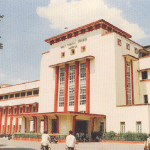
Nagpur: After more than a decade of persistent efforts, Nagpur’s aspiration for a Government Cancer Hospital is on the verge of becoming a reality. The foundation stone for this crucial healthcare project will be laid by Deputy Chief Minister Devendra Fadnavis on the campus of Government Medical College and Hospital (GMCH) in Nagpur.
This momentous occasion coincides with the 75th anniversary of GMCH, and Fadnavis will also inaugurate a series of developmental initiatives totalling Rs 30 crore.
Deputy Chief Minister Devendra Fadnavis’s visit holds immense significance as it marks his first appearance at the institution after assuming the position of reception committee chief for the GMCH diamond jubilee celebrations. This occasion not only signifies a milestone in the history of GMCH but also represents the culmination of a journey characterized by determination and delays.
The journey towards establishing Nagpur’s Government Cancer Hospital has been marked by determination and challenges. Initiated in 2012 through patient advocacy, the project encountered court-mandated deadlines in 2017. Administrative approvals followed in 2019, but funding hurdles temporarily halted progress in 2022. However, in 2023, the Medical Education and Drugs Department allocated funds for the project, breathing new life into its realization.
The Nagpur Metro Region Development Authority (NMRDA) is the nodal agency responsible for overseeing the project. An initial allocation of Rs 20 crore has been made for commencing construction. Subsequent phases have received provisional sanction of Rs 78 crore, and an additional allocation of over Rs 50 crore has been earmarked for equipment procurement.
The Government Cancer Hospital at GMCH is poised to become a beacon of hope for cancer patients in Vidarbha and Central India, regions that have experienced an alarming rise in cancer cases over the years. The hospital, set to be a three-storey building with 110 beds, will provide treatment at subsidized rates due to its government-funded nature. Patients falling below the poverty line (BPL) will receive treatment and essential medications free of cost.
The hospital will feature dedicated departments for radiation oncology, medical oncology, surgical oncology, and paediatric oncology. It will house modern surgical and medical intensive care units, advanced operation theatres, and wards, ensuring that patients receive comprehensive and state-of-the-art care.











